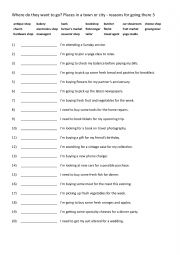
Where do they want to go Places in a town or city - reasons for going there 3
With answers.
Level: elementary
Age: 8-100
Type:
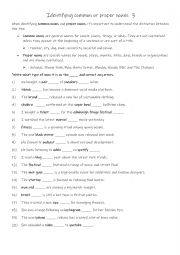
Identifying common or proper nouns 3
First, students need to familiarise themselves with the 2 types of nouns. Then they read the sentences to identify and use the correct punctuation for all of the sentences. Answers on page 2
Level: elementary
Age: 8-100
Type:

Food & cooking Gerund or infinitive practise
Answers on next page.
Level: elementary
Age: 8-100
Type:

Practise with past simple or past continuous tense 4
With answers.
Level: elementary
Age: 8-100
Type:
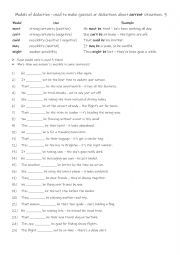
Modals of deduction - used to make guesses or deductions about current situations. 3
Students should learn modals of deduction because they are useful for expressing logical guesses or assumptions about present situations, helping speakers show how certain or uncertain they are. These modals, such as must, might, could, and can�t, make speech sound more natural and fluent, improve communication and reasoning skills, and are commonl...
Level: elementary
Age: 8-100
Type:
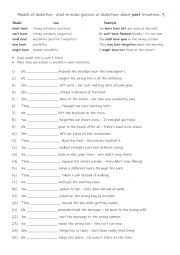
Modals of deduction - used to make guesses or deductions about past situations. 3
Students should learn modals of deduction because they are useful for expressing logical guesses or assumptions about past situations, helping speakers show how certain or uncertain they are. These modals, such as must have, might have, could have, and can�t have, make speech sound more natural and fluent, improve communication and reasoning skills...
Level: elementary
Age: 9-100
Type:

Where do they want to go. Places in a town or city - reasons for going there 4
With answers.
Level: elementary
Age: 8-100
Type:

girls for change
Level: intermediate
Age: 11-16
Type:

Practise with past simple or past continuous tense 5
With answers.
Level: elementary
Age: 7-100
Type:

to be/have got/can
This is an elementary worksheet for beginners to practice talking about themselves and to notice the difference between using to be, have got or can in present.
Level: elementary
Age: 5-12
Type:

A2+-B1 Future continuous or future perfect 4
Understanding these tenses allows students to communicate future goals, schedules, and timelines effectively, enhancing both their speaking and writing skills for academic, professional, and everyday use. First, students need to familiarise themselves with the 2 tenses and their use. Then they read the sentences to work out which tense is needed to...
Level: elementary
Age: 9-100
Type: worksheet

Expressions of preference, desire, or regret I�d rather, I wish, if only & it�s time 3
Students should learn expressions of preference, desire, or regret like "I�d rather," "I wish," "If only," and "It�s time" because they help them communicate personal feelings, make choices, and reflect on past experiences or future possibilities in English. These phrases allow students to express what they want, what they regret, or what they feel...
Level: elementary
Age: 9-100
Type:
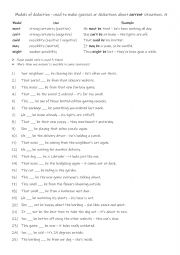
Modals of deduction - used to make guesses or deductions about current situations. 4
Students should learn modals of deduction because they are useful for expressing logical guesses or assumptions about present situations, helping speakers show how certain or uncertain they are. These modals, such as must, might, could, and can�t, make speech sound more natural and fluent, improve communication and reasoning skills, and are commonl...
Level: elementary
Age: 8-100
Type:
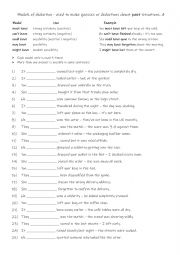
Modals of deduction - used to make guesses or deductions about past situations. 4
Students should learn modals of deduction because they are useful for expressing logical guesses or assumptions about past situations, helping speakers show how certain or uncertain they are. These modals, such as must have, might have, could have, and can�t have, make speech sound more natural and fluent, improve communication and reasoning skills...
Level: elementary
Age: 8-100
Type:

adjective or adverb
Adjective or adverb
Level: intermediate
Age: 8-100
Type:
|
|
|